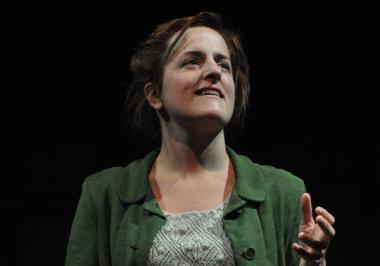Both Freud's Last Session, at Barrington Stage Company's Stage 2, and Faith Healer, in the Berkshire Theatre Festival's Unicorn Theatre, bore into questions of truth and illusion, faith and fraud. One takes the form of a dialogue between two rationalists who have come to diametrically opposite conclusions about the existence of God. The other is a bleak tale of hope and disillusionment knit together in a series of extended monologues.
Freud's Last Session, by Mark St. Germain, is receiving its world premiere at Barrington Stage after being workshopped there last year. It imagines a meeting between Sigmund Freud, shortly before he took his own life, and C.S. Lewis, who early in his career satirized the father of psychoanalysis as a "vain, ignorant old man" blinded by his own self-importance.
They meet, in the playwright's imagination, in Freud's London study on September 3, 1939, the day Britain declared war on Germany following Hitler's invasion of Poland. Their edgy conversation is punctuated by news bulletins and an air raid siren. The topics circle around many of the themes in both men's lives and thought, including morality and suffering, fantasy and mythology, fathers, suicide and, of course, sex. But mostly they debate religion.
Despite its title, the play is not a psychoanalytic session (though the famous couch figures prominently, even provocatively, in Brian Prather's set). Instead, it's a two-way exploration of divergent world views. Lewis is best known as the author of the Chronicles of Narnia, but much of his writing flowed from his conversion, through a process of deductive reasoning, from atheism to Christianity. This in contrast to Freud's rejection of the idea of God as a wish-fulfillment illusion.
In St. Germain's script and Martin Rayner's performance, Freud is an acerbic octogenarian whose wry wit is tempered by constant pain from the oral cancer that is sapping his desire to live. Mark H. Dold's Lewis is dapper, confident, unawed by Freud's reputation, and certain to the point of smugness. Under Tyler Merchant's sensitive direction, both performances are strong and plausible—we see real people on stage, not just impersonations.
The exchange strikes emotional chords as well as scoring intellectual points, and each man is obliged at least once to pause and take stock of his own assumptions,. But in the end, this 75-minute one-act feels more like a scene from a longer, more complete play, one that goes further than an interesting but necessarily inconclusive skirmish from opposite sides of the faith divide.
Healer, Heal Thyself
The sparse attendance at last Saturday's performance of Brian Friel's Faith Healer evoked the empty seats in the shabby village halls where the title character holds his "performances." And that's too bad, because this is the more challenging but ultimately more satisfying of the two plays.
Frank Hardy is an itinerant Irishman who caters to the hopeless hopes of the physically afflicted. Seedy, debt-ridden, often drunk, he plies the rural towns of Scotland and Wales, whose mellifluous names he intones like an incantation. Frank is a healer without faith, a loser in whom illusion and despair vie for control. He's not a charlatan, exactly, but has little faith in his own gift and only "very occasionally" pulls off a miracle.
Faith Healer is not a traditional play but a set of four monologues, the first and last spoken by Frank, the middle pair by Frank's wife Grace and his Cockney manager Teddy. A kind of dramatic structure unfolds as each of them relates a different, often sharply divergent version of their nomadic life together. We meet the trio in the aftermath of Frank's homecoming to Ireland and a climactic disaster in Ballybeg, the fictitious Donegal village that figures in most of Friel's plays. At the heart of the play is the playwright's—indeed, Ireland's—recurrent obsession with self-delusion, the double-edged sword that defends cherished dreams but kills the soul.
Colin Lane plays the faith healer with a battered defiance that evokes Frank's years on the road and his dashed dreams. But we get little sense at first of the charisma and restless energy that have sustained him, or the hubris that contributes to his downfall. Our interest in the character is only fully engaged by the reminiscences of Grace and Teddy. The latter, a self-styled "showman," has gone from handling a bagpipe-playing dog and a trained-pigeon act to managing Frank's dead-end career. Gulping his way through a cabinetful of brown ale, he regales us with stories of his artistes' triumphs and disasters. While David Adkins doesn't quite capture the Cockney's accent or cocky charm, he provides some welcome comic relief amidst the desolation.
We find Grace nursing the trauma of that night in Ballybeg (we don't find out for sure what happened until the very end), measuring her fragile recovery by the whiskeys she pours—and she pours a lot. In a long, heartbreaking scene in which she not only paints the bleakest picture of the three but deteriorates before our eyes, Keira Naughton is spellbinding. Every moment is truly felt and deeply true—as perfect a performance as you're likely to see all summer.
Director Eric Hill has fine-tuned the dynamics of each monologue and woven the four sections into a coherent whole. Faith Healer is a dark, complex play, requiring more than passive attention from its audience. Its effect is cumulative, and by the end its many layers—tragic, mysterious, whimsical, horrifying—dovetail powerfully and convincingly.
Freud's Last Session: through July 3, Stage 2, Barrington Stage Company, 36 Linden St, Pittsfield, (413) 236-8888, www.barringtonstageco.org.
Faith Healer: through July 4, Unicorn Theatre, Berkshire Theater Festival, 6 East St., Stockbridge, (413) 298-5576, www.berkshiretheatre.org.



